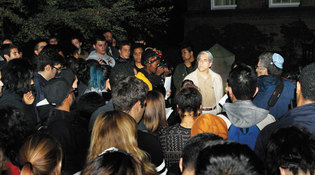 loading
loading
featuresWhy here? Why now?An interview with Yale president Peter Salovey ’86PhD about student protests and diversity. This interview was conducted both in person and by e-mail and condensed for print.  Arnold GoldView full imageY: The question that we heard from alumni was why here, why now? Why Yale? At Yale, it was a combination of things—an allegation about behavior at a fraternity party and a controversy over memos written concerning Halloween weekend. But to focus on the initial incident is to miss the larger issues. Yale has never been more diverse, has never had such a mixture of students coming from very, very different backgrounds. I think that, fundamentally, all of our students want to feel that they belong here—that this is their Yale. But to feel this sense of true belonging requires effort for some students. For students who are the first in their family to go to college, the entire environment is new. Nobody could have prepared them or their families for what they would encounter here. There are students at Yale who in their high school preparation have had wide exposure to the kinds of topics that are discussed in a Yale classroom, and there are students who are equally smart, equally deserving to be at Yale, but have had less of that before coming here. Students also reported to us that, for instance, they have different experiences in the classroom. Some students feel that they can express themselves at will in any conversation. Others feel that they are called on to represent something bigger than themselves—to speak on behalf of some identity they may have—and they find that a burden. And what we heard over and over again from students was: I just want to have the same experiences as everyone else at Yale. I want this to be my Yale. You asked why now, why here? Why here is easy to answer: it isn’t just here. My colleagues at other universities have described the same student concerns. I’ve heard these issues from almost every campus leader I’ve spoken to. Why now is a more interesting question. Think about what undergraduates at Yale have observed in the real world: disproportionate numbers of African American men and women in prison; incidents of police overreaction, with tragic results, affecting people their own age; the Fisher v. University of Texas case being debated by the Supreme Court; the resegregation of public schools in so many parts of the country; debates about who can be American and who cannot. Then we need to think about the way polarizing reports in the media and the speed of the Internet magnify the emotional impact of all this. Because students come to campus with a more varied set of prior experiences, we need to do more to ensure that everyone can appreciate Yale to the fullest—so that everyone can fulfill their potential here, so that everyone can have the rich educational and character-building experience of a Yale education. There are a number of issues we discussed in the fall that are important across all of the campus. For instance, mental health, stress, the need to build resilience—we have seen these crop up everywhere at Yale. In fact, graduate students are even more likely to make use of professional counseling and psychological services than are undergraduates. So when we sent our message of November 17 [see “Future plans” box], we were responding to many, many more conversations than just the immediate interactions with protesters. We consulted faculty, students, and staff all around Yale, as well as many alumni. And the plans we put together incorporate a great deal of work and preparation begun long before this fall. Y: One of the goals the protesters talked about is “safe space.” To many alumni, that sounded as if students don’t want to hear material that is painful. And alumni have asked, is that reasonable? Can a university be expected to make things always comfortable? Y: You confirmed to the Silliman community that the Christakises will remain at their posts in Silliman. Did you consider at all the request of Next Yale that the Christakises be removed? So there was never a question of punishing anyone for speech on this campus. The only question was making sure we took the time to get a clear understanding of what the situation has been in Silliman College, and what the interactions have been like between the master and the students. From day one, it was always clear in my mind that no one was going to be pushed out of his or her position because of an opinion stated in an e-mail message. Y: Did you get any pushback from the students after you announced that the Christakises would stay? Y: Henry “Sam” Chauncey [’57], the former secretary of the university, sent us a quote from Yale president Kingman Brewster [’41]: “Universities should be safe havens where ruthless examination of realities will not be distorted by the aim to please or inhibited by the risk of displeasure.” But Brewster also said, “Never let disagreement fester into disrespect.” The Woodward Report was quite clear that there may be times when the desire for full and free expression might seem to conflict with the desire to maintain positive relationships, such as friendships. What it says is that the value of positive relationships—friendship and respect—is incredibly important but cannot stand ahead of the desire for full and free expression. I like President Brewster’s formulation because it agrees that social relationships can’t take precedence over free expression. But it also says that we should foster a campus where, as much as it is possible and as often as it is possible, there is no conflict between these two values: that disagreement, even intense disagreement, even disagreement rooted in hearing things that are offensive, won’t sever friendships. That may sound idealistic. But I think Yale should always be pursuing that ideal.
The comment period has expired.
|
|